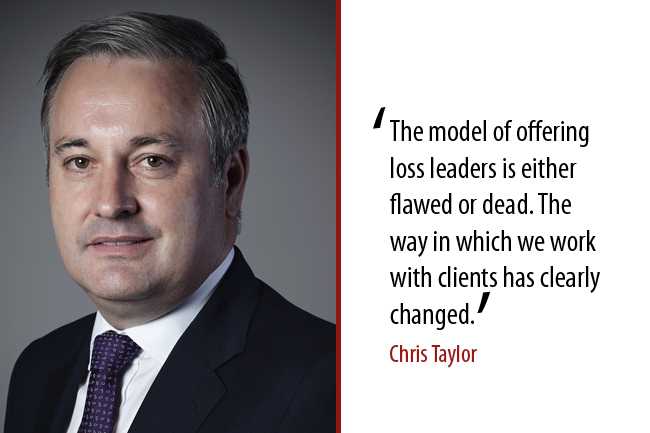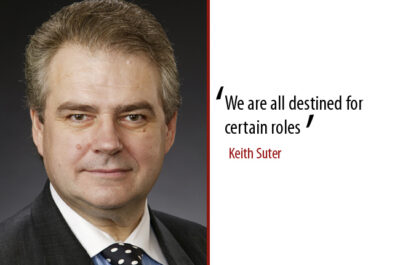From globetrotting to globalisation… an ex-pat’s new challenge at home
Chris Taylor has spent more of his 25 years with State Street, where he started as a graduate fund accountant in Sydney, in either the UK or Asian offices. On his recent return to Australia to head up the firm’s Global Services and Global Markets businesses, he said he was “really struck” by the local market’s sophistication and large asset pools. He spoke to Greg Bright about Australia’s position in the region and life as an ex-pat.
People come to the funds management industry with varying backgrounds and educational qualifications. Most have commerce, mathematics or engineering degrees. Some, however, started out in the arts. Chris Taylor, for instance, who has recently transferred from Hong Kong, has a degree in fine arts with a major in history. He admits that one of the attractions of joining the global firm in his early 20s was the chance to see the world, which he has largely done.
Within a short time of joining State Street in 1989 Taylor was sent to Tokyo on an assignment for the Global Markets division to do with the then-embryonic business of securities finance. “They were growing businesses and [State Street] then offered me a job in London,” he says, where he worked between 1993 and 1998, becoming an expert in the field.
His return to Sydney coincided with the Asian Financial Crisis and Taylor was appointed to head up securities finance for the region, spending time commuting between Sydney and Tokyo.
With State Street’s acquisition of the Deutsche securities servicing business in Europe in 2003, Taylor was sent back to London, firstly to implement that merger, but remaining there until 2010, when he moved to Hong Kong, where he headed up ‘sector solutions’ for the region for Global Markets and Global Securities, prior to returning to Australia in June.
With four school-age children, family was an important part of the recent decision, as well as the challenges of a job in what is both the biggest regional market outside Japan and is also the market which is probably going through the most structural change.
After 10 years of relative stability in the Australian securities services landscape, there have been two recent global entrants into super fund servicing – firstly Northern Trust and, last year, Citi – and the possible exit of the last Australian bank standing – National Australia Bank Asset Servicing.
Taylor says he is unable to talk specifically about the NAB proposed sale, which was announced on July 1, except to say that one would expect State Street to be an interested party, along with some of its big competitors. NAB has more than $600 billion of assets under custody, in domestic, master and global custody arrangements. It is not known, at least publicly, whether NAB is looking to retain the domestic book or to sell the lot. In the meantime, a couple of big NAB clients – Australian Unity and VFMC – are tendering their custody contracts.
Taylor adds that it takes a long time to get things to happen in Asia. In Australia, the opportunities are more immediate. A global company needs to attend to both types of opportunities.
On the ex-pat lifestyle, he says that State Street spends a lot of time at management level looking at its pools of talent and strategizing around them, attempting to “round out” executives’ experiences.
“Each move that I made has worked for me on a personal level,” he says, “but I’ve had a bit of luck too. My wife is a mobile professional as a chartered accountant and she understood the moves.”
The State Street group globally, including the funds management arm, SSgA, set itself the goal, in the early 2000s, of getting to the stage of having 50 per cent of its revenue derived from non-US sources. This became unlikely in the short term after the company took over some other US businesses, so it has set itself the new task of doubling its non-US business. As important, Taylor says, is that the Asian business in particular has tended to become more self-sufficient within the group.
Another change in the region of which Taylor was an integral part was the switch away from focusing on product lines and focusing instead on the requirements of individual clients. The firm set up its sector solutions teams for business development and client servicing, with Taylor heading up the four regional sector teams in Hong Kong. “We’re trying to recalibrate the client experience away from products and individual business lines and more towards the various segments that the clients represent and holistic solutions they are looking for,” he says.
“There are two aspects to this. Firstly, we think that clients are, as a rule, procuring fewer one-dimensional products but they want bigger and more meaningful relationships. They are rationalizing their relationships and viewing the world differently. Secondly, a lot of the [product] world has been unbundled. The model of offering ‘loss leaders’ is either flawed or dead. The way in which we work with clients has clearly changed.”
As part of this, State Street’s marketing has become more sophisticated and integrated across the group, through the provision of more thought leadership and research papers for clients. This has always been a strength of Boston head office, from which global marketing is co-ordinated.
“With this work it’s not about a business line or product,” Taylor says. “We do client surveys each year and we’ve had a lot of positive feedback. We’ve started to work with the Financial Times, for example, to provide research which is produced jointly.”
In securities finance, where Taylor cut his teeth, the market has changed since the global financial crisis. He sees this as an evolution: “When I first joined in lending, people talked about generating income. That morphed into attribution analyses of how you made that income. The third iteration involves what risks you took to do so. It’s become viewed a quasi-investment management mandate.”
He believes that the market will return to focusing more on traditional stock lending and less on securities financing, which relies on re-investment of the cash. It will become more of a “specials program” to extract the intrinsic value of the stock. “Lending can be a very effective way of generating incremental return and/or reducing expenses,” he says.










